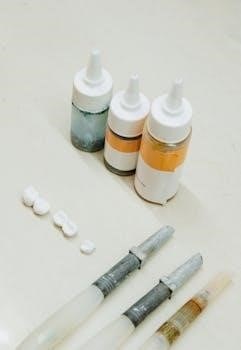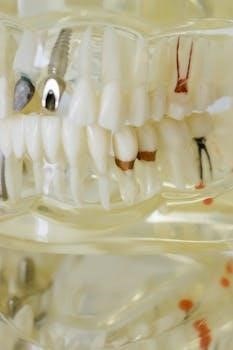Post-Operative Dental Implant Instructions
Following these instructions carefully after your dental implant surgery will help ensure proper healing and minimize complications. It is crucial to adhere to all guidelines provided by your dentist for optimal results and long-term implant success;
Immediate Post-Op Care (First 24 Hours)
The first 24 hours following your dental implant surgery are critical for initiating the healing process. Avoid disturbing the surgical area to allow proper clot formation. Do not rinse, spit, or probe the area with your fingers or tongue. These actions can dislodge the blood clot and delay healing.
Apply ice packs to the side of your face near the surgical site for 10-15 minutes at a time, alternating with 10-15 minute breaks. This helps minimize swelling and discomfort. Rest is essential during this initial period. Avoid strenuous activities that could increase blood flow to the surgical area.
Take prescribed pain medication as directed by your dentist to manage any discomfort. Before taking any over-the-counter medication, consult with your dentist or oral surgeon. If you were prescribed chlorhexidine gluconate (Peridex), do NOT use it until after the first 24 hours, or as directed by your dentist.

Gentle pressure with gauze pads can help control any initial bleeding. Change the gauze pads as needed. Remember, some bleeding is normal during the first 24 hours. Elevate your head while resting or sleeping to further minimize swelling. By following these immediate post-operative instructions, you are setting the stage for a successful and comfortable recovery.

Managing Bleeding After Implant Surgery
Some bleeding after dental implant surgery is normal and expected, particularly within the first 24 hours. The key is to manage it effectively to promote healing. If you experience bleeding, avoid frequent rinsing or spitting as this can disturb the blood clot that is forming, essential for proper healing. Instead, apply gentle pressure to the surgical area using a clean gauze pad. Fold the gauze and place it directly over the implant site, ensuring it is positioned firmly.
Maintain constant pressure for at least 30 minutes to an hour. If the bleeding persists, replace the gauze with a fresh one and continue applying pressure. Avoid talking excessively or moving your mouth too much during this time, as this can interfere with clot formation. If bleeding continues, try using a moistened tea bag wrapped in gauze. The tannic acid in tea can help to constrict blood vessels and reduce bleeding. Apply pressure with the tea bag for 30 minutes.
Keep your head elevated, even while resting or sleeping, to minimize blood flow to the area. Avoid any strenuous activity that could increase your heart rate and blood pressure, as this can exacerbate bleeding. It’s important to distinguish between normal oozing and excessive bleeding. A small amount of blood-tinged saliva is normal. If you experience heavy bleeding that does not subside after applying pressure, or if you notice large clots forming, contact your dentist or oral surgeon immediately for further instructions.
Dietary Recommendations⁚ Soft Foods and Avoidances

Following dental implant surgery, your diet plays a crucial role in the healing process. The primary goal is to minimize trauma to the surgical site while ensuring you receive adequate nutrition. For the first few days, it’s essential to adhere to a strict soft food diet. This reduces the need for chewing, preventing unnecessary pressure on the implant area. Excellent choices include yogurt, applesauce, mashed potatoes, smoothies (without seeds), protein shakes, and well-cooked, soft pasta. These options are easy to swallow and require minimal effort to digest.
As you progress in your recovery, you can gradually introduce slightly more solid foods, but continue to avoid anything hard, crunchy, or chewy. Consider incorporating scrambled eggs, soft-cooked fish, or ground meat into your meals. Always cut food into small, manageable pieces and chew on the opposite side of your mouth from the implant site. It’s also important to maintain proper hydration by drinking plenty of water and other clear liquids.
There are several foods and beverages to avoid altogether during the initial healing phase. Steer clear of anything that could irritate the surgical area or increase the risk of infection. This includes spicy foods, which can cause discomfort and inflammation. Hot liquids should also be avoided as they can disrupt the blood clot. Hard and crunchy foods, such as nuts, seeds, chips, and raw vegetables, can damage the implant site and delay healing. Chewy foods, like gum and tough meats, require excessive chewing and can put undue stress on the implant. Finally, avoid alcohol and carbonated beverages, as they can interfere with the healing process and potentially interact with pain medications. By carefully following these dietary recommendations, you can promote optimal healing and ensure the success of your dental implant.
Oral Hygiene⁚ Brushing and Rinsing Guidelines
Maintaining excellent oral hygiene after dental implant surgery is paramount to prevent infection and promote proper healing. While it’s crucial to keep the surgical area clean, you must do so gently and carefully to avoid disrupting the healing process. For the first 24 hours post-surgery, avoid brushing directly on or near the implant site. However, you should still brush your other teeth as usual to maintain overall oral hygiene. Use a soft-bristled toothbrush and a gentle, circular motion.
After the first 24 hours, you can begin to gently clean the area around the implant. Use a very soft toothbrush and be extremely cautious not to apply too much pressure. If you have sutures, be careful not to snag them with the toothbrush. Your dentist may recommend a special interdental brush or floss threaders to help clean hard-to-reach areas around the implant. In addition to brushing, rinsing your mouth with a saltwater solution is highly recommended. Dissolve about half a teaspoon of salt in a cup of warm water and gently rinse your mouth for about 30 seconds, two to three times a day. This helps to keep the area clean and reduces the risk of infection.
Avoid vigorous rinsing or spitting, as this can dislodge the blood clot and delay healing. If your dentist has prescribed a chlorhexidine mouthwash (such as Peridex), use it as directed. This mouthwash has antibacterial properties and can further help prevent infection. However, it should not be used as a substitute for brushing and flossing. Continue these oral hygiene practices diligently throughout the healing process. Regular dental check-ups are also essential to monitor the implant’s progress and ensure long-term success. By following these brushing and rinsing guidelines, you can significantly reduce the risk of complications and promote optimal healing after your dental implant surgery.
Pain Management and Medications
Managing pain effectively is a crucial aspect of post-operative care following dental implant surgery. It’s normal to experience some discomfort after the procedure, but with the right approach, it can be effectively controlled. Your dentist or oral surgeon will likely prescribe pain medication to help alleviate any discomfort. Follow the prescribed dosage and timing instructions carefully. Do not exceed the recommended dose, and be sure to take the medication with food if advised, to avoid stomach upset. Common pain medications prescribed after dental implant surgery include opioids (such as codeine or hydrocodone) and non-steroidal anti-inflammatory drugs (NSAIDs) like ibuprofen or naproxen.
Opioids are stronger pain relievers and are typically prescribed for more severe pain. NSAIDs are effective for milder pain and also help reduce inflammation. Your dentist will determine the most appropriate medication based on your individual needs and pain level. If you are prescribed an opioid, be aware of potential side effects such as drowsiness, constipation, and nausea. Avoid driving or operating heavy machinery while taking opioids. If you experience any severe side effects, contact your dentist immediately. In addition to prescription pain medication, over-the-counter pain relievers like acetaminophen (Tylenol) can also be used to manage mild discomfort. However, do not take acetaminophen in combination with opioid medications that already contain acetaminophen, as this can lead to liver damage.
It’s important to communicate openly with your dentist about your pain levels. If the prescribed medication is not providing adequate relief, or if you experience any unusual symptoms, contact your dentist promptly. In some cases, alternative pain management strategies, such as ice packs and relaxation techniques, may also be helpful. Applying ice packs to the cheek near the surgical site can help reduce pain and swelling. Relaxation techniques, such as deep breathing or meditation, can also help you manage pain and reduce anxiety. By following your dentist’s instructions and taking your medication as prescribed, you can effectively manage pain and promote a comfortable recovery after your dental implant surgery. Remember to always consult with your dentist before taking any new medications or supplements.
Swelling Control⁚ Cold Compresses
Controlling swelling is a critical part of post-operative care after dental implant surgery. Swelling is a natural response to the surgical trauma and typically peaks within the first 24 to 48 hours after the procedure. Applying cold compresses to the affected area is an effective way to minimize swelling and discomfort. The cold temperature helps constrict blood vessels, reducing blood flow to the surgical site and thereby limiting the amount of swelling that occurs. To properly use cold compresses, apply an ice pack or a bag of frozen vegetables wrapped in a thin cloth to the cheek near the implant site. Avoid applying ice directly to the skin, as this can cause frostbite. Apply the cold compress for 20 minutes at a time, followed by a 20-minute break. Repeat this cycle as frequently as possible during the first 24 to 48 hours after surgery.
It’s important to maintain a consistent schedule of cold compress applications to achieve the best results. After the first 48 hours, the benefits of cold compresses diminish, and you may switch to warm compresses if desired. Warm compresses can help improve blood flow to the area, which can aid in the healing process. However, if swelling persists or worsens after 48 hours, continue using cold compresses and contact your dentist. In addition to cold compresses, keeping your head elevated can also help reduce swelling. When resting or sleeping, use extra pillows to prop up your head. This will help prevent fluid from accumulating in the surgical area. Avoid strenuous activities that could increase blood flow to the head, as this can worsen swelling. While some swelling is normal after dental implant surgery, excessive swelling can be a sign of a complication, such as an infection.
If you experience significant swelling that does not improve with cold compresses, or if you notice any other signs of infection, such as fever, redness, or pus, contact your dentist immediately. By following these instructions for swelling control, you can minimize discomfort and promote a smoother recovery after your dental implant surgery. Remember that consistent and proper application of cold compresses in the initial days post-surgery is key to managing swelling effectively. Always consult with your dentist if you have any concerns about your swelling or healing process.
Restrictions⁚ What to Avoid After Surgery
Following dental implant surgery, it is crucial to adhere to certain restrictions to ensure proper healing and prevent complications. Avoiding specific activities and habits in the initial post-operative period can significantly impact the success of the implant. One of the primary restrictions is refraining from smoking. Smoking can impair blood flow to the surgical site, hindering the healing process and increasing the risk of implant failure. Nicotine and other chemicals in cigarettes can also compromise the body’s ability to fight infection, making you more susceptible to post-operative complications. It is strongly advised to quit smoking altogether, but at the very least, avoid smoking for several weeks before and after the surgery.
Another important restriction is avoiding strenuous physical activity. Engaging in intense exercise or heavy lifting can increase blood pressure and cause throbbing or bleeding at the surgical site. It is recommended to take it easy for the first few days after surgery and gradually resume normal activities as tolerated. Additionally, avoid using straws, as the sucking motion can dislodge blood clots and lead to dry sockets, a painful condition that delays healing. Similarly, avoid spitting forcefully, as this can also disrupt the clot formation. Instead, gently blot any excess saliva with a tissue. It is also essential to avoid touching or probing the surgical area with your fingers or tongue. This can introduce bacteria into the wound and increase the risk of infection. Leave the area undisturbed to allow for proper healing.
Dietary restrictions are also crucial. Avoid hard, crunchy, or chewy foods that can put pressure on the implant site. Stick to soft foods that require minimal chewing, such as yogurt, mashed potatoes, and soup. Also, avoid hot liquids and spicy foods, as they can irritate the surgical area. Maintaining good oral hygiene is important, but avoid brushing directly on the surgical site for the first few days. Gently rinse your mouth with a saltwater solution to keep the area clean. By adhering to these restrictions, you can minimize the risk of complications and promote a smooth and successful recovery after your dental implant surgery. Always follow your dentist’s specific instructions and contact them if you have any concerns or questions.
Potential Complications and When to Call the Dentist
While dental implant surgery is generally safe and successful, it’s essential to be aware of potential complications and know when to seek professional help. Recognizing these issues early can prevent more serious problems and ensure a smooth recovery. One potential complication is excessive bleeding. Some oozing is normal in the first 24 hours after surgery, but if bleeding is heavy or persistent despite applying pressure with gauze, contact your dentist immediately. Prolonged bleeding can indicate a problem with clot formation or wound closure. Another possible complication is infection. Signs of infection include increased pain, swelling, redness around the implant site, and pus or discharge. You may also experience a fever or chills. If you suspect an infection, it’s crucial to call your dentist promptly, as untreated infections can compromise the implant’s success and lead to more significant health issues.
Nerve damage is another potential, though rare, complication. If you experience numbness, tingling, or altered sensation in your lip, chin, tongue, or gums after surgery, it could indicate nerve damage. While some nerve irritation is temporary, persistent or worsening symptoms should be reported to your dentist. Sinus problems can occur if implants are placed in the upper jaw, particularly if they protrude into the sinus cavity. Symptoms may include sinus pain, pressure, congestion, or discharge. Contact your dentist if you experience these issues, as further evaluation and treatment may be necessary.

Implant failure, although uncommon, is a possibility. Signs of implant failure include increased mobility of the implant, pain when chewing, or bone loss around the implant. If you suspect your implant is failing, schedule an appointment with your dentist for an evaluation. Early intervention may help save the implant or prevent further complications. It’s also important to be aware of the possibility of an allergic reaction to medications or materials used during the surgery. If you experience itching, rash, hives, or difficulty breathing, seek immediate medical attention; Always inform your dentist of any allergies you have before the procedure. Finally, persistent pain that is not controlled by prescribed pain medication should also be reported to your dentist. While some discomfort is expected after surgery, severe or unrelenting pain could indicate a problem that needs to be addressed. By being vigilant and knowing when to contact your dentist, you can minimize the risk of complications and ensure a successful outcome for your dental implant.
Long-Term Implant Care and Maintenance
Maintaining the health and longevity of your dental implants requires diligent long-term care and maintenance. Think of your implants as an investment in your oral health and smile, and commit to a routine that ensures their continued success. Proper oral hygiene is the cornerstone of long-term implant care. Brush your teeth at least twice a day, using a soft-bristled toothbrush and fluoride toothpaste. Pay special attention to the areas around your implants, gently cleaning the gumline to remove plaque and bacteria. Interdental brushes, also known as proxy brushes, are excellent for cleaning between the implant and adjacent teeth, as well as around the abutment (the connector between the implant and the crown). These small brushes can reach areas that a regular toothbrush cannot, helping to prevent inflammation and infection.
Flossing is equally important for removing plaque and food particles from between your teeth and around your implants. Use waxed floss or special implant floss, which is designed to be gentle on the gums and implant surfaces. Be sure to floss carefully around each implant, sliding the floss gently between the implant and the adjacent tooth. In addition to brushing and flossing, consider using an antimicrobial mouthwash to further reduce bacteria in your mouth. Choose a mouthwash that is specifically designed for use with dental implants and follow the instructions carefully. Avoid mouthwashes that contain alcohol, as they can dry out your mouth and irritate the gums.
Regular dental check-ups and professional cleanings are essential for long-term implant maintenance. Visit your dentist every six months, or more frequently if recommended, for a thorough examination and cleaning. Your dentist will check the stability of your implants, assess the health of your gums, and remove any plaque or tartar buildup that you may have missed. During these appointments, your dentist may also take X-rays to monitor the bone level around your implants and ensure that they are properly integrated with the jawbone. In addition to your regular dental visits, it’s important to maintain a healthy lifestyle. Avoid smoking, as it can significantly increase the risk of implant failure. Limit your intake of sugary foods and drinks, as they can contribute to plaque buildup and gum disease. If you grind your teeth at night, talk to your dentist about wearing a nightguard to protect your implants from excessive force. By following these long-term care and maintenance guidelines, you can help ensure the health, stability, and longevity of your dental implants for many years to come.
